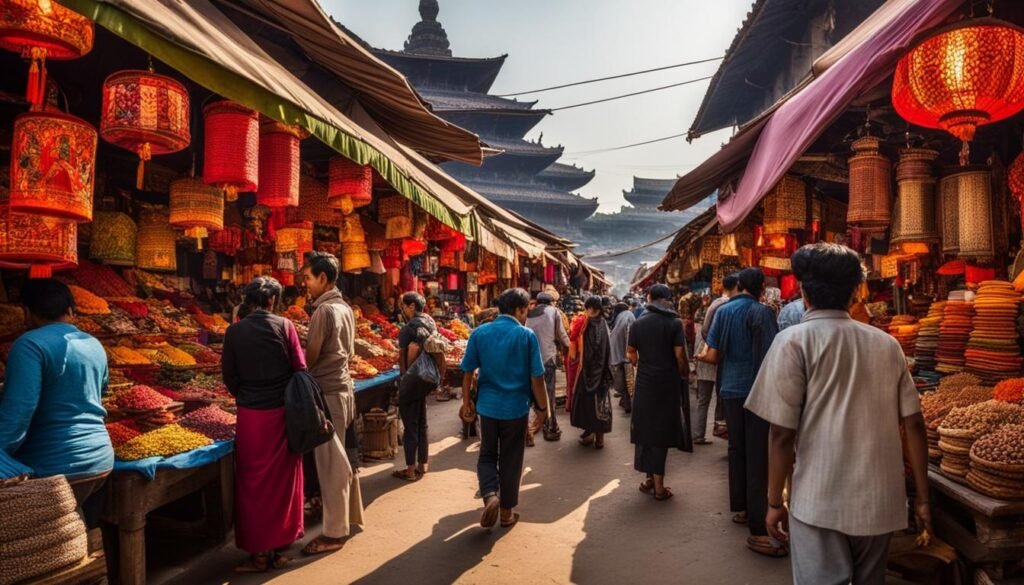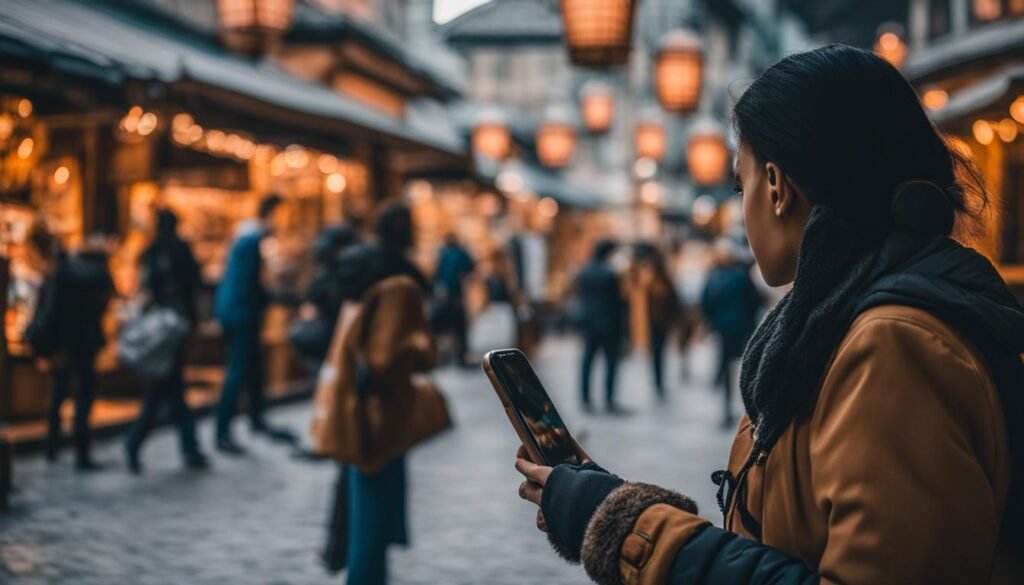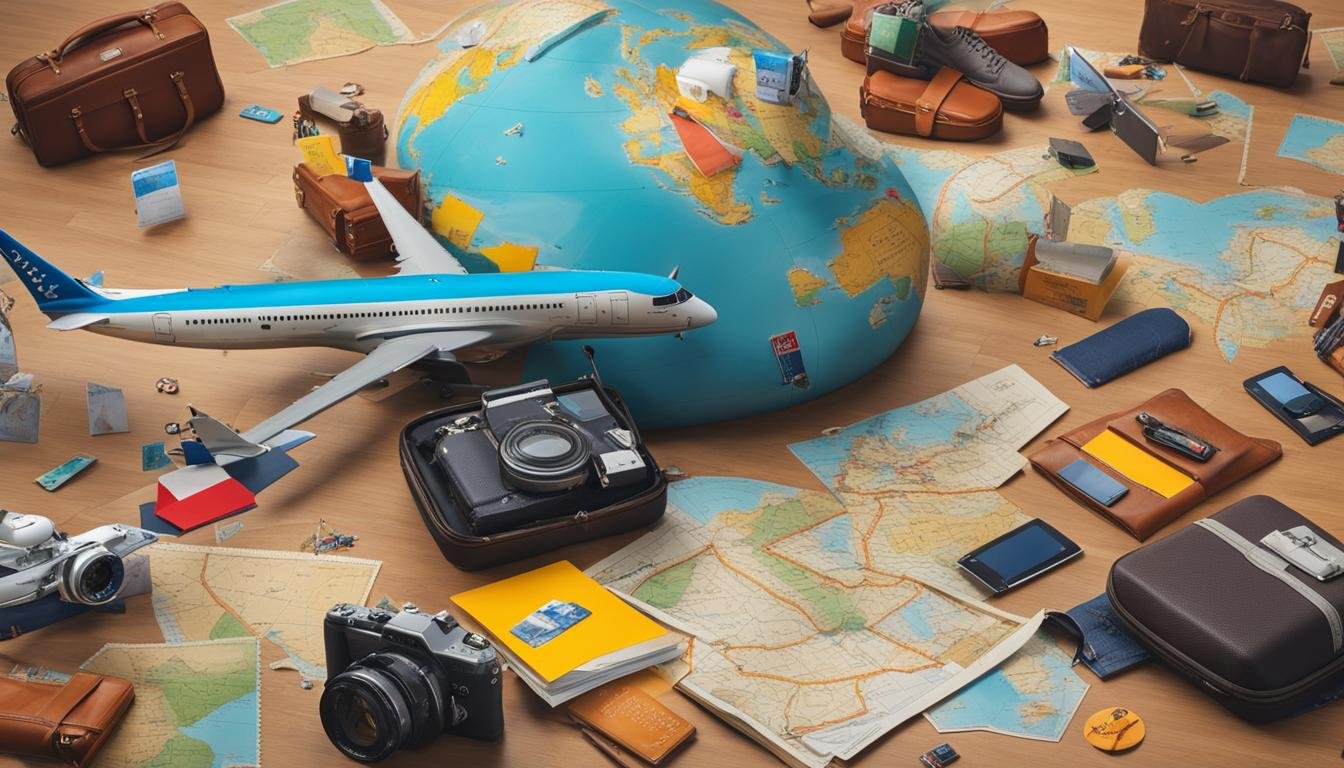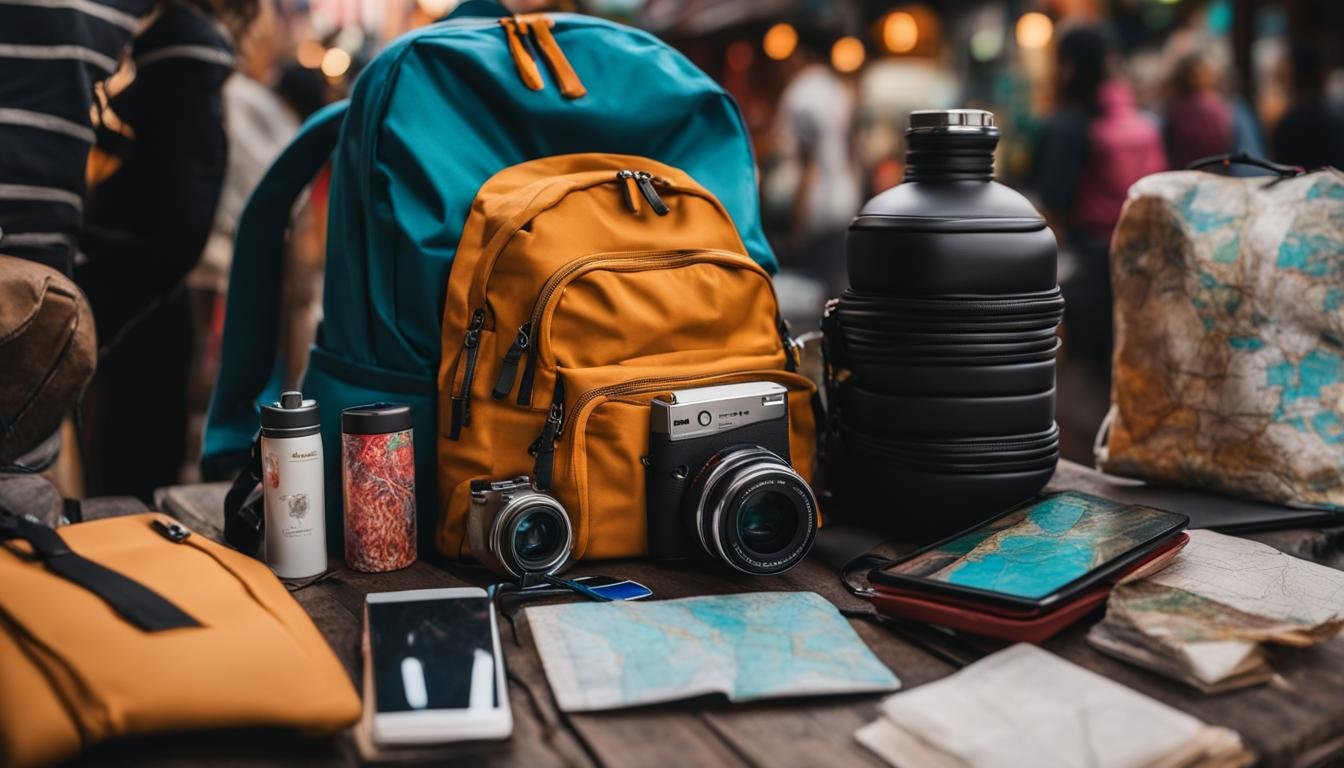Welcome to our comprehensive guide on travel etiquette and how to be a model tourist on your trips. Traveling is an exciting adventure, but it’s important to be mindful of our impact on the local community and environment. By practicing responsible tourism and respecting cultural customs, we can enhance our travel experiences and contribute to the sustainable development of tourism.
When traveling internationally, it’s essential to familiarize yourself with proper conduct and social norms for travelers. Understanding the dos and don’ts of traveling will help you navigate different cultures with ease and respect. Whether it’s learning a few basic phrases in the local language or dressing appropriately to blend in, small gestures can go a long way in creating positive connections with locals.
Key Takeaways:
- Responsible tourism is crucial for minimizing the negative impact of tourism.
- Being respectful of local culture and traditions is a key aspect of travel etiquette.
- Supporting the local community and practicing environmental sustainability are important traits of a responsible tourist.
- Being cautious and aware of scams and pickpockets can help ensure your safety while traveling.
- Using social media ethically and responsibly can contribute to responsible travel practices.
What is Responsible Tourism?
Responsible tourism and sustainable tourism are two terms often used interchangeably, but they have distinct differences. While sustainable tourism focuses on long-term environmental, social, and economic impacts, responsible tourism relies on individuals making choices that have a positive impact on the destination.
A responsible tourist aims to blend in with the locals, respect local culture, and contribute to the local economy. By supporting local businesses, embracing cultural customs, and practicing environmentally friendly behaviors, responsible tourists help create better places for people to live in and visit.
Responsible tourism can be defined as making choices that benefit the local community and environment.
Responsible tourist behavior goes beyond simply following dos and don’ts while traveling. It is about being mindful of the impact one has on the destination and taking steps to ensure a positive contribution. Responsible tourism enhances the travel experience by fostering authentic connections and promoting sustainability.
Table: Responsible Tourism vs. Sustainable Tourism
| Responsible Tourism | Sustainable Tourism |
|---|---|
| Focuses on individual choices | Focuses on long-term impacts |
| Blends in with locals | Considers environmental, social, and economic aspects |
| Respects local culture | Strives for long-term sustainability |
| Contributes to local economy | Promotes responsible resource management |
By understanding the definition and importance of responsible tourism, travelers can make conscious choices that benefit both the destinations they visit and the people who call those places home.
The Problems Faced by Tourists
Tourists often encounter various issues when traveling, including overtourism, resentment from locals, being targeted by scams and pickpockets, and facing long wait times due to social media popularity.
Overtourism is a growing problem in many popular destinations. It occurs when the number of tourists exceeds the carrying capacity of the place, resulting in overcrowding, strained resources, and negative impacts on the local environment and community.
Locals may develop resentment towards tourists when they feel disrespected or when their cultural norms and way of life are not acknowledged. Lack of cultural understanding and inappropriate behavior can lead to tension and a breakdown in the relationship between tourists and locals.
Scams and pickpockets are prevalent in some tourist destinations. Travelers can become targets due to their unfamiliarity with the local environment and their perceived wealth. It is important for tourists to be cautious, stay aware of their surroundings, and take precautions to protect their valuables.
The popularity of social media has contributed to an increase in wait times for popular attractions. Travelers often visit places that are heavily promoted on social media, leading to overcrowding, long queues, and a diminished experience for everyone.
| Problems Faced by Tourists | Description |
|---|---|
| Overtourism | When the number of tourists exceeds the carrying capacity of a destination, leading to overcrowding, strained resources, and negative impacts on the local environment and community. |
| Resentment from locals | When locals feel disrespected or when cultural norms are not acknowledged, leading to tension and a breakdown in the relationship between tourists and locals. |
| Targeted by scams and pickpockets | Travelers can become targets due to their unfamiliarity with the local environment and their perceived wealth. It is important to be cautious and take precautions to protect valuables. |
| Long wait times due to social media popularity | The popularity of social media has led to increased visitation at popular attractions, resulting in long queues and a diminished experience for everyone. |
Dressing to Blend In: Avoid Looking Like a Tourist
When traveling to a new destination, it’s important to dress in a way that allows you to blend in with the locals and avoid looking like a tourist. By dressing appropriately, you not only show respect for the local culture but also enhance your overall travel experience. Here are some tips on how to dress for comfort and style while avoiding wearable kitsch.
“Dressing appropriately while traveling is an important aspect of responsible tourism. It helps you show respect for the local culture and allows you to immerse yourself in the destination. Avoiding typical tourist clothing and accessories is key to blending in with the locals and avoiding the label of a tourist.”
Choose Comfortable and Stylish Outfits
When selecting your travel wardrobe, opt for smart casual or resort casual outfits that are both comfortable and stylish. Avoid wearing clothing with non-local logos or excessive displays of nationalism, as this can sometimes give away your status as a tourist. Instead, choose versatile pieces that can be easily mixed and matched, allowing you to create different looks for various occasions.
Avoid Tourist “Uniforms”
Avoiding typical tourist clothing can greatly help you blend in with the locals. Steer clear of conspicuous items such as fanny packs, baseball caps, and oversized cameras hanging around your neck. Instead, opt for practical accessories like a crossbody bag or a backpack to keep your belongings secure while maintaining a stylish and low-key appearance.
| Do: | Avoid: |
|---|---|
| Opt for neutral colors and classic styles. | Wearing clothing with non-local logos. |
| Choose comfortable footwear for walking. | Wearing socks with sandals. |
| Respect the local dress code. | Wearing overtly patriotic clothing. |
By dressing to blend in with the locals, you not only show respect for the destination but also reduce the chances of becoming a target for scams or pickpockets. Dressing appropriately is a simple yet effective way to enhance your travel experience and ensure a more authentic and enjoyable trip.
Respecting Local Culture and Traditions
When traveling to a new destination, it is essential to respect the local culture and traditions. By doing so, you not only show appreciation for the country you are visiting but also contribute to a more positive and meaningful travel experience. Here are some tips on how to respect local culture while traveling:
- Learn the local language: Making an effort to learn a few basic phrases in the local language goes a long way in showing respect and connecting with the locals. Simple greetings like “hello,” “thank you,” and “goodbye” can create a friendly atmosphere and help you navigate through your travels more smoothly.
- Embrace the sense of place: To truly immerse yourself in the local culture, try to embrace the sense of place. This means being open to new experiences, trying local food, participating in cultural activities, and respecting local customs and traditions. By showing genuine interest and curiosity, you can gain a deeper understanding of the destination and its people.
- Seek authenticity in travel: In an era of mass tourism and commercialization, seeking authentic experiences is becoming more important than ever. Avoid tourist traps and instead, look for opportunities to support local businesses, artisans, and initiatives that promote sustainable and responsible tourism. This way, you can contribute to the preservation of local culture and ensure that your travel experiences are meaningful and genuine.
Remember, respecting local culture is not just about following rules and customs. It is about approaching your travels with an open mind, empathy, and a willingness to learn from and connect with the people you meet along the way. By doing so, you can create lasting memories and make a positive impact on the communities you visit.

Table: Dos and Don’ts of Respecting Local Culture
| Do | Don’t |
|---|---|
| Learn basic phrases in the local language | Assume everyone speaks English |
| Observe and respect local customs and traditions | Disrespect or mock local customs |
| Support local businesses and artisans | Only frequent chain restaurants and shops |
| Ask for permission before photographing locals or religious sites | Take photos without consent or inappropriately |
| Keep an open mind and be receptive to new experiences | Compare everything to your home country |
Giving Back: Responsible Tourist Behavior
As a responsible tourist, it’s important to give back to the local communities you visit. By supporting local businesses and artisans, you can contribute to the economic growth of the destination. Buying locally made products and eating at local restaurants not only supports the local economy but also allows you to experience the authentic flavors and craftsmanship of the region.
In addition to supporting local communities, responsible tourists also prioritize environmental sustainability. This includes reducing waste, reusing items, and recycling whenever possible. By being conscious of your consumption and making eco-friendly choices, you can minimize your impact on the environment and help preserve the natural beauty of the destination.
One of the ways to minimize the impact on popular destinations is by traveling off-peak seasonally. By avoiding peak travel periods, you can help reduce overcrowding and support a more sustainable tourism model. Additionally, traveling independently or in small groups allows for a more immersive and authentic experience, fostering meaningful connections with the local culture and community.
Responsible Tourist Traits:
- Supporting local communities
- Reducing, reusing, recycling
- Traveling off-peak seasonally
- Traveling independently or in small groups
Responsible tourism is not just about being a passive observer, but actively engaging with the local community and environment in a positive way. By giving back and practicing responsible tourist behavior, you can make a tangible difference in the places you visit, leaving a positive legacy for future travelers.
| Benefits of Giving Back as a Tourist | How to Give Back |
|---|---|
| Supports local economy | Buy locally made products |
| Preserves local culture | Eat at local restaurants |
| Minimizes environmental impact | Reduce waste and recycle |
| Enhances travel experiences | Travel off-peak seasonally |
By incorporating these responsible tourist traits into your travel habits, you can have a positive impact on the destinations you visit. Responsible tourism goes beyond just being a visitor; it’s about being an active and conscientious participant in the global travel community.
Avoiding Scams and Pickpockets
When traveling, it’s important to be aware of potential scams and pickpocketing risks to ensure a safe and enjoyable trip. By taking a few precautions and staying vigilant, you can significantly reduce the chances of falling victim to these common tourist traps.
One of the most effective ways to protect yourself is to familiarize yourself with common tourist scams in the destination you are visiting. Research and educate yourself on the tactics used by scammers, such as fake police officers, distraction techniques, or overcharging for goods and services. This knowledge will help you identify and avoid these situations.
Another important tip is to keep your valuables secure at all times. Use a hidden money belt or a secure bag that is difficult for pickpockets to access. Avoid flaunting expensive jewelry or electronics that may attract unwanted attention. Be particularly cautious in crowded areas, tourist attractions, and on public transportation where pickpockets tend to operate.
“Awareness is key when it comes to avoiding scams and pickpockets while traveling. Stay alert, trust your instincts, and don’t be afraid to say no if something feels suspicious. Taking precautions can go a long way in ensuring a safe and memorable travel experience.”
Traveling with a companion can also help deter potential thieves. Stick together and keep an eye out for each other’s belongings. If you’re traveling alone, consider joining a guided tour or group activity where you can meet other like-minded travelers and have the added security of a group setting.
Remember, the key to avoiding scams and pickpockets is to stay vigilant, be aware of your surroundings, and trust your instincts. By taking these simple steps, you can enjoy a worry-free journey and focus on creating unforgettable memories.
| Travel Safety Tips | Protecting Your Valuables |
|---|---|
| Research common tourist scams in the destination. | Use a hidden money belt or a secure bag. |
| Be aware of your surroundings at all times. | Avoid flaunting expensive jewelry or electronics. |
| Trust your instincts and say no if something feels suspicious. | Keep your belongings secure in crowded areas. |
| Stick together and watch out for each other’s belongings. | Consider joining a guided tour or group activity. |
Responsible Social Media Use
In today’s digital age, social media plays a significant role in how we share our travel experiences with the world. However, it is important to use social media ethically and responsibly to avoid any negative impact on the destinations we visit. By following a few guidelines, we can ensure that our travel posts contribute to responsible tourism and promote ethical behavior.
When posting to social media, it is crucial to be mindful of the privacy and consent of others. Before sharing photos or personal information, ask yourself if it respects the privacy of the locals or fellow travelers who may be in the background. Always obtain permission before posting pictures of people, especially if they are children.
Furthermore, consider the environmental implications of your social media use. Avoid geotagging specific locations in sensitive ecosystems or culturally significant sites. Geotagging can attract unwanted attention and contribute to overcrowding, potentially damaging these delicate environments. Wait until after your trip to post on social media to avoid drawing attention to your current location, especially in remote or protected areas.
Responsible travel posts on social media should also focus on promoting cultural understanding and appreciation. Use your platform to highlight the beauty of local traditions, customs, and arts. Give credit where it is due by tagging and mentioning local businesses, artisans, and tour operators who contributed to your positive travel experience. By doing so, you can support the local economy and encourage others to engage responsibly with the destination.

Table: Tips for Ethical Social Media Use
| Tip | Description |
|---|---|
| Respect Privacy | Obtain consent before posting pictures of people, especially if they are children. Be mindful of the privacy of locals and fellow travelers. |
| Avoid Geotagging | Avoid geotagging specific locations in sensitive ecosystems or culturally significant sites to prevent overcrowding and potential damage. |
| Promote Culture | Use your platform to showcase and appreciate the local traditions, customs, and arts. Tag and mention local businesses and artisans. |
| Wait to Post | Avoid posting in real-time to prevent unwanted attention to your current location, especially in remote or protected areas. |
By being responsible and ethical on social media, we can use this powerful tool to inspire others to travel responsibly, promote cultural understanding, and support local communities. Remember, every post has the potential to make a positive impact. Let’s use it wisely!
The Importance of Authenticity and Sustainability
Authenticity and sustainability are fundamental aspects of responsible tourism. In today’s travel landscape, there is a growing desire among travelers to experience destinations in their truest form and to support practices that have a positive impact on the environment and local communities.
However, the pursuit of authenticity can be compromised by various factors. Overtourism, for example, can lead to overcrowding in popular destinations, resulting in the loss of local culture and a diluted travel experience. The influence of global brands and tourism can also contribute to the erosion of authenticity, as destinations may become homogenized to cater to mass tourism.
Furthermore, the environmental impact of travel has come under scrutiny, with concepts like flight shaming gaining attention. Travelers are increasingly aware of the carbon emissions associated with air travel and are seeking greener alternatives or taking steps to offset their carbon footprint. Greenwashing, where organizations falsely claim to be environmentally friendly, has also become a concern in the travel industry.
Despite these challenges, responsible tourism offers numerous benefits. By prioritizing authenticity and sustainability, travelers can have more enriching travel experiences and make a positive difference in the destinations they visit. Local communities can benefit from responsible tourism through economic support, preservation of culture, and the protection of natural resources. Responsible travel also encourages a deeper understanding and appreciation of different cultures and environments.
In conclusion, authenticity and sustainability are essential in responsible tourism. Travelers should strive to preserve local culture, seek genuine experiences, and make environmentally conscious choices. By embracing responsible travel practices, we can ensure the long-term viability and enrichment of the places we visit.
Traveling Responsibly: Enriching Your Travel Experiences
Traveling responsibly not only allows you to have a positive impact on the destinations you visit but also enriches your travel experiences. By following responsible travel tips, you can create meaningful connections with the local culture and create memories that will last a lifetime.
One important aspect of responsible travel is learning about the local customs and traditions. By familiarizing yourself with the cultural norms of the destination, you show respect to the locals and can engage more deeply with the community. Learning a few basic phrases in the local language can also go a long way in bridging the communication gap and immersing yourself in the local culture.
Another way to enhance your travel experiences responsibly is by seeking alternatives to popular tourist spots. While famous attractions are undoubtedly worth visiting, they can often become overcrowded and lose some of their charm. By venturing off the beaten path and exploring lesser-known destinations, you can discover hidden gems, interact with locals on a more personal level, and have a more authentic experience.
Lastly, responsible travel means leaving no trace. It’s essential to minimize your impact on the environment and respect the natural surroundings of the places you visit. Follow the principles of “pack it in, pack it out” by properly disposing of your waste and avoiding activities that may harm the environment. By leaving no trace, you ensure that future generations can also enjoy the beauty of these destinations.
Table: Responsible Travel Tips
| Responsible Travel Tips | Benefits |
|---|---|
| Respect local customs and traditions | Deepen your cultural understanding and build positive relationships with the local community |
| Seek alternatives to popular spots | Discover hidden gems, avoid overcrowding, and have a more authentic experience |
| Learn basic phrases in the local language | Facilitate communication, show respect to locals, and immerse yourself in the local culture |
| Leave no trace | Preserve the natural environment for future generations and minimize your impact on the ecosystem |
By following these responsible travel tips, you can make a positive difference while exploring the world. Embrace the opportunity to learn, respect, and protect the places you visit, and you’ll find that your travel experiences become even more enriching and fulfilling.
Conclusion
In conclusion, responsible travel and adhering to travel etiquette are essential for becoming a model tourist and leaving a positive impact on the destinations you visit. By being mindful of your actions and respecting the local culture and environment, you can enhance your travel experiences and contribute to the sustainable development of tourism.
Remember that responsible tourism is an ongoing learning process, and your efforts can truly make a difference. From dressing appropriately to blending in with the locals to supporting local communities and practicing environmental sustainability, every action counts.
By following these guidelines, you can ensure that your travel experiences are authentic, respectful, and enriching. So, as you embark on your next adventure, keep in mind the importance of responsible travel, and strive to become a model tourist who not only creates cherished memories but also leaves behind a positive legacy.
FAQ
What is responsible tourism?
Responsible tourism refers to making choices that have a positive impact on the destination, including supporting local businesses, respecting local culture, and minimizing environmental impact.
What is the difference between sustainable tourism and responsible tourism?
Sustainable tourism focuses on long-term environmental, social, and economic impacts, while responsible tourism relies on individuals making choices that have a positive impact on the destination.
Why is responsible tourism important?
Responsible tourism is important to counteract the negative effects of tourism, such as overtourism and strained resources. It also allows travelers to have a positive impact on the local community and environment.
How can I blend in with the locals while traveling?
To blend in with the locals, avoid typical tourist clothing and accessories, opt for smart casual or resort casual outfits, and avoid clothing with non-local logos or displays of nationalism.
How can I respect the local culture when traveling?
To respect the local culture, make an effort to learn about the customs and cultural norms of the destination, learn a few basic phrases in the local language, and seek authentic experiences that allow you to connect with the local culture.
How can I give back to the local community as a responsible tourist?
To give back to the local community, support local businesses and artisans by buying locally made products and eating at local restaurants. Practice environmental sustainability by reducing waste, reusing items, and recycling when possible.
How can I avoid scams and pickpockets while traveling?
To avoid scams and pickpockets, be cautious and aware of your surroundings, keep your valuables secure, be mindful of your belongings in crowded areas, and stay informed about common scams in the destination you are visiting.
How can I use social media responsibly while traveling?
To use social media responsibly, be mindful of the impact of your posts on the local community and environment, consider the privacy and consent of others before sharing photos or personal information, and wait until after your trip to post on social media to avoid attracting unwanted attention to your current location.
Why is authenticity important in responsible tourism?
Authenticity is important in responsible tourism as it allows travelers to connect with the local culture and supports the preservation of local traditions. It also helps counteract the influence of global brands and tourism on local communities.
How can I enhance my travel experiences through responsible travel?
To enhance your travel experiences through responsible travel, learn about the local customs and etiquette, seek out alternative attractions and off-the-beaten-path destinations, and minimize your impact on the environment by leaving no trace.
How can I become a model tourist?
To become a model tourist, be mindful of your actions, respect the local culture and environment, support the local community, and continuously educate yourself about responsible tourism practices.



